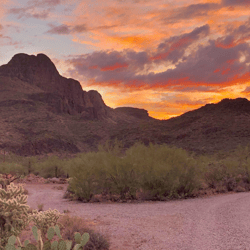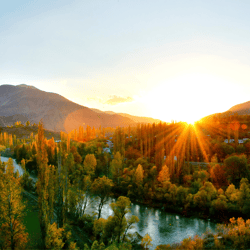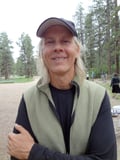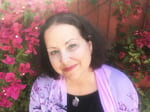
Soulcraft™: A Guide to the Numinous Depths
An Interview with Brian Stafford, M.D., M.P.H.
“Soulcraft skills and practices evoke the world-shifting experience of soul encounter —the revelation of our unique mythopoetic identity, an identity expressed through symbol and metaphor, image and dream, archetype and myth, an identity embodied in a mysterious story that whispers to us in moments of expanded awareness and exquisite aliveness.”
“Introduction to Soulcraft™” with Doug Van Houten and Brian Stafford will be a zoom workshop from Pacifica, October 28-30, 2022. For more information, visit our website. Brian Stafford is “a guide to the wilderness of nature and soul” and “an agent of cultural awakening and transformation.” I’m delighted to be speaking with him.
Angela: If one were to ask for your business card, one would see “Adult, Adolescent, Child, Infant and Perinatal Psychiatrist,” as well as “Depth Psychiatrist and Pediatrician.” One might also see “Psychedelic Psychiatrist: Facilitator, Preparation, and Integration” and “Vision Fast Guide, Eco-therapist, Retreat Facilitator, and Independent Scholar.” That, I think, speaks of a lifetime of learning, teaching, and inquiring into deeply imaginative and interesting modalities of healing. How did so winding a road lead you to Soulcraft™?
Brian: Yes, that’s a great and interesting question. I was always curious about the stories we live or the narratives we tell ourselves about who we are. When I was twenty-one and wondering what “path” I might choose or what path might choose me, I found myself camping in the wilderness for days at a time, reading myth and poetry, fishing, taking long hikes. I was also reading the psychiatrist Robert Coles’ book The Call of Stories and Erik Erikson’s Childhood and Society. It became clear that I felt called to be some kind of developmentally informed healer, a healer of stories, perhaps. And what I saw out there at that time was psychiatry. So, I applied to medical school with the hopes of being accepted and training to be a pediatrician and adult and child psychiatrist. Fortunately, I was accepted and later accepted into residency and fellowship training in those three realms. After my residencies and fellowships, I chose to work in South Africa and then trained in perinatal and infant psychiatry, with the hope that a good early start for a human could lead to healthy development. I loved the clinical work that I did with impoverished families. I loved teaching psychiatry, behavior, development, and attachment to the pediatric residents, and helping them in what they should know and do as clinicians and when referrals to others were warranted. I loved building systems of care for families in need or to bring mental health support to primary care. I also loved the academic research life and was successful in getting institutional, foundation, and federal grants. And I loved publishing clinical, research, and other articles and chapters about the work I was doing with others.
And then came mid-life, a promotion to an endowed chair position, and some curious longings and questions: to know more of what life really was? Why was I born at this time? How to support the Earth? I started analytic therapy since I sensed the questions were more about meaning, purpose, and spirituality than how to fit in to our society. The therapy was helpful in some ways but my journey really kicked in after I read Bill Plotkin’s Soulcraft: Crossing into the Mysteries of Nature and Psyche. By about page 10, I remember saying to myself, “If this is the way the world is, this is the world I want to live in!” That book—Bill’s first book—tells the story of Bill’s self-enacted vision fast as well as the experience of many other individuals he guided on fasts and other nature-based, soul-informed immersions. The numinous encounters, the magic, the mystery, the synchronicities, the dreams, the visions all met with a deep knowing that this type of conversation with the world was possible. This was the type of conversation I hoped was possible but never heard about. I certainly hadn’t heard about this in my medical or psychiatric training…. where nature was never mentioned and Jung was evidently deemed only worthy of one 55-minute lecture.
I immediately signed up for a program called a Soulcraft Journey and had an incredible experience in a Utah canyon—powerful dreams, mystical encounters, coming home to Earth, community. Several months later I enacted my own wilderness fast and died to what I thought I and the Earth was, and was born anew with a mystical identity, a vision of who I was to be in the world. This vision, this mythopoetic identity, this metaphor, made me realize that the traditional medical model and psychiatric view of the human was limited and limiting. I now had irreconcilable worldview differences with the profession in which I had been trained and thrived. Several months later I gave a presentation to about 100 colleagues entitled “Putting Psyche Back into Psychiatry,” and I never felt more alive. Several months later, I left medicine and psychiatry altogether and began training with the Animas Valley Institute to become a nature-based soul initiation guide.
Angela: The term Soulcraft™ might seem to indicate that the soul is something we ourselves craft or perhaps an art form we perfect. What does the term mean to you, and what is your understanding of what the soul is, as compared to say, the psyche?
Brian: That’s a great question and maybe a misunderstanding of soul and craft. Soulcraft is a bundle of practices that includes deep imagery journeys, solo and group ceremonies, soul-centric dreamwork, council work, storytelling, wilderness fasts, trance dancing and drumming, symbolic artwork, nature and soul-oriented poetry, and conversations with the land and her other other-than-human inhabitants—birds, trees, creeks, the wind, the moon.
And by “soul,” I mean something similar and different to what Jung wrote, and also somewhat different than what Hillman was writing about. The Founder of the Animas Valley Institute, Bill Plotkin, describes soul as our unique ecological place based on a revelation of our mythopoetic identity. And our mythopoetic identity is a metaphor of the poetic or mythic images and intuitive patterns that we discover we are to live and, in fact, have already been living. This is very much in line with what I have discovered in my own conversation with the underworld of the psyche.
 Angela: Many scholars at Pacifica explore the relationship between the human psyche and the natural world, positing connections that extend our understanding of our own awareness into something greater than our individual identity. You are “a guide to the wilderness of nature and soul,” guiding people simultaneously to remote areas in nature as well as “to the place they most long and fear to go—the numinous depths of their soul.” What is the fundamental connection for you between the wild unknown, the places where our version of civilization fades, and the healing and transformation of the soul?
Angela: Many scholars at Pacifica explore the relationship between the human psyche and the natural world, positing connections that extend our understanding of our own awareness into something greater than our individual identity. You are “a guide to the wilderness of nature and soul,” guiding people simultaneously to remote areas in nature as well as “to the place they most long and fear to go—the numinous depths of their soul.” What is the fundamental connection for you between the wild unknown, the places where our version of civilization fades, and the healing and transformation of the soul?
Brian: Another great question! One way to answer that question might be to describe the two great separations, or the two huge developmental delays in our species. And much of this can be also traced back to Jung’s own Journey, as described in the Red and Black Books, but also in his biography, Myths, Dreams, and Reflections. (MDR) If one looks carefully in Jung’s MDR (and also in the collection The Earth has a Soul, edited by Meredith Sabini), one sees that Jung was very different from many of his child and adolescent peers, his family, and his professional colleagues. Rife within MDR are his statements that nature always felt more like his home than did his father’s church. One of the experiences we witness on many of our wilderness programs, but especially our vision fasts, is an experience we call eco-awakening. Eco-awakening is more than nature connection, more than the research description of nature-relatedness. It is a mystical experience of one’s primary connection and belonging to Earth.
So, when I write or speak about being a guide to nature, it connotes that I am guiding people to a deep mystical connection with nature, an Eco-Awakening experience that is transformative. We, at Animas have tracked that this Eco-Awakening is likely an artifact of being raised in Western society, a society that keeps nature at a distance, and keeps our development delayed and estranged from what we call the Nature-Based Tasks of Human Development. (See Bill’s Nature and the Human Soul for a lengthy description of his eco/soulcentric developmental wheel or Chapter 1 in his The Journey of Soul Initiation. The experience of soul encounter often happens when one is in a non-ordinary state of consciousness and is developmentally ready. From time immemorial, individuals have returned to nature to find their place in the fabric of things and their gifts for their people. Getting away from a busy, screen-filled, and self-confirming setting and into the wild can allow one to forget who they think they are and to remember who they are at the soul level.
Angela: For the “Introduction to Soulcraft™” event with Doug Van Houten, you will explore Soulcentric Dreamwork, Deep Imagery Work, Talking Across the Species Boundaries, The Way of Council, The Nature-based Map of the Human Psyche, Shadow Work, Soul Poetry, and more. What can participants expect from this experience in terms of experience, transformation, and growth?
Brian: This Introduction to Soulcraft™ is highly experiential even though offered online. We will weave practices offered in the online group space as well as explored in solitude in nature near where you reside. We share and deepen these experiences in our online small group clans and breakout groups. The result will be an online transformational and ‘in the wild’ personal experience.
And, hopefully, individuals who attend will bring their longing, their grief, their hope and their imagination, and a sense of beginner’s mind. It is one thing to read and study, one thing to synthesize and metabolize and adapt or challenge the theories of others. It is another thing entirely to directly experience what the nature and soul mystics were writing about themselves. This is what is possible. An introductory or further step toward the deeper identity that awaits us.
Angela: Thank you so much for speaking with me. Is there anything else you’d like potential participants to know about Soulcraft™ and the workshop ahead?
Brian: Sure. Some individuals might have read some of Bill’s books. This can be helpful but shouldn’t be equated with the experiential nature of what Bill is writing about. And, some individuals might be assisted by reading one of Bill’s books prior to the program, especially Soulcraft and the Journey of Soul Initiation.
Please join us October 28-30, 2022 for “Introduction to Soulcraft™ with Doug Van Houten and Brian Stafford.” For more information, click here.

Brian Stafford, MD, MPH, is a guide to the wilderness of nature and soul. He was called out of academic medicine to serve as a guide to the depths and to serve as an agent of cultural awakening and transformation. He guides with humor, playfulness, compassion, discernment, and a deep remembering of the fullness of what each human life can, should, and was meant to be. A native of Colorado and the former holder of an endowed chair and professor of psychiatry and pediatrics, he is an avid outdoorsman, teacher, writer, mentor, partner, and parent. He guides individuals and groups in the Colorado River Basin as well Nosara, Costa Rica, to the place they most long and fear to go—the numinous depths of their soul. Brian currently makes his home in Ojai, California.

Angela Borda is a writer for Pacifica Graduate Institute, as well as the editor of the Santa Barbara Literary Journal. Her work has been published in Food & Home, Peregrine, Hurricanes & Swan Songs, Delirium Corridor, Still Arts Quarterly, Danse Macabre, and is forthcoming in The Tertiary Lodger and Running Wild Anthology of Stories, Vol. 5.



